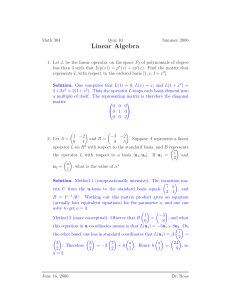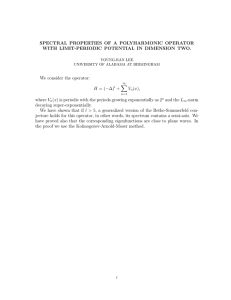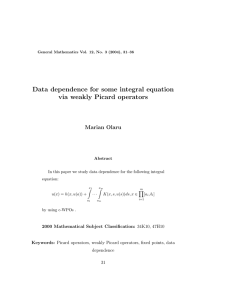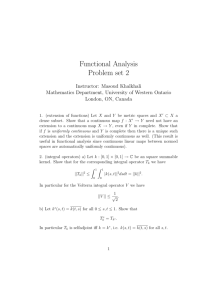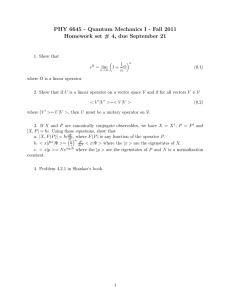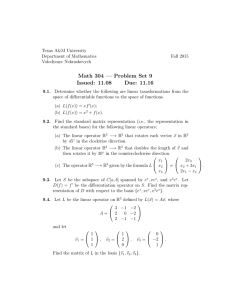Data dependence for some integral equation via weakly Picard operators
advertisement
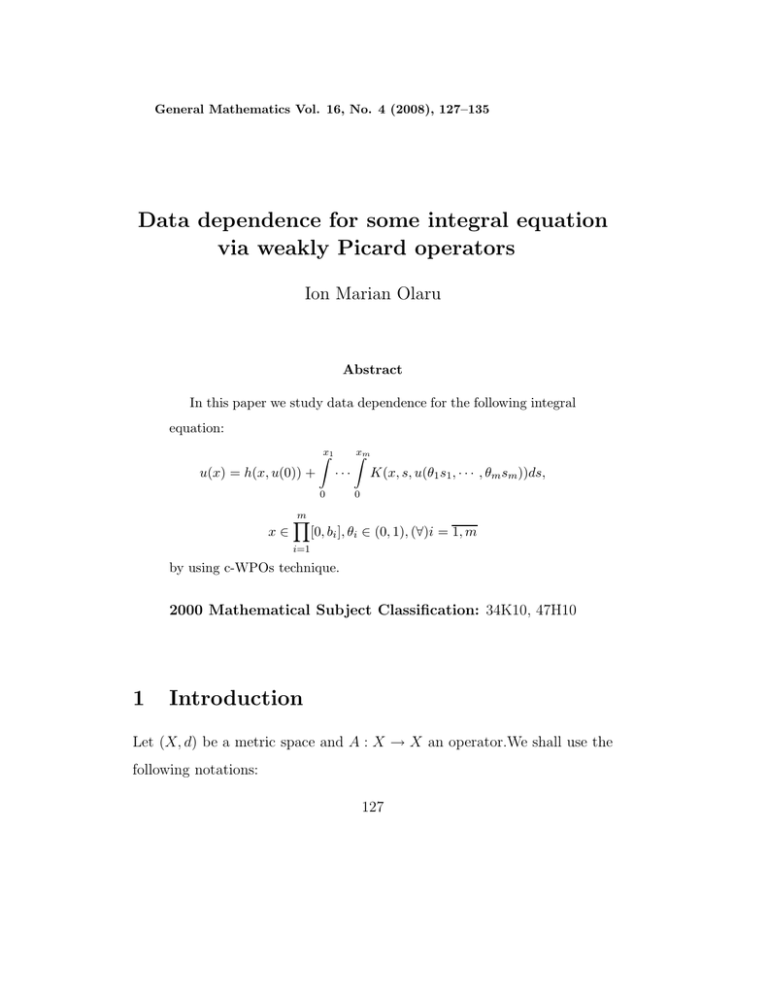
General Mathematics Vol. 16, No. 4 (2008), 127–135
Data dependence for some integral equation
via weakly Picard operators
Ion Marian Olaru
Abstract
In this paper we study data dependence for the following integral
equation:
x1
u(x) = h(x, u(0)) +
xm
· · · K(x, s, u(θ1 s1 , · · · , θm sm ))ds,
0
x∈
0
m
[0, bi ], θi ∈ (0, 1), (∀)i = 1, m
i=1
by using c-WPOs technique.
2000 Mathematical Subject Classification: 34K10, 47H10
1
Introduction
Let (X, d) be a metric space and A : X → X an operator.We shall use the
following notations:
127
Data dependence for some integral equation ...
128
FA := {x ∈ X | A(x) = x} the fixed points set of A.
I(A) := {Y ∈ P (X) | A(Y ) ⊂ Y } the family of the nonempty invariant
subsets of A.
An+1 = A ◦ An , A0 = 1X , A1 = A, n ∈ N.
Definition 1.[1] An operator A is weakly Picard operator (WPO) if the
sequence
(An (x))n∈N
converges , for all x ∈ X and the limit (which depend on x ) is a fixed point
of A.
Definition 2.[1] If the operator A is WPO and FA = {x∗ } then by definition A is Picard operator.
Definition 3.[1] If A is WPO, then we consider the operator
A∞ : X → X, A∞ (x) = lim An (x).
n→∞
We remark that A∞ (X) = FA .
Definition 4.[1] Let be A an WPO and c > 0.The operator A is c-WPO if
d(x, A∞ (x)) ≤ c · d(x, A(x)).
We have the following characterization of the WPOs:
Theorem 1.[1]Let (X, d) be a metric space and A : X → X an operator.
The operator A is WPO (c-WPO) if and only if there exists a partition of
X,
X=
9
λ∈Λ
Xλ
Data dependence for some integral equation ...
129
such that
(a) Xλ ∈ I(A)
(b) A | Xλ : Xλ → Xλ is a Picard (c-Picard) operator, for all λ ∈ Λ.
For the class of c-WPOs we have the following data dependence result:
Theorem 2.[1] Let (X, d) be a metric space and Ai : X → X, i = 1, 2 an
operator. We suppose that:
(i) the operator Ai is ci − W P O, i = 1, 2.
(ii) there exists η > o such that
d(A1 (x), A2 (x)) ≤ η, (∀)x ∈ X.
Then
H(FA1 , FA2 ) ≤ η max{c1 , c2 }.
Here stands for Hausdorff-Pompeiu functional.
We have:
Lemma 1.[1],[3] Let(X, d, ≤) be an ordered metric space and A : X → X
an operator such that:
a)A is monotone increasing.
b)A is WPO.
Then the operator A∞ is monotone increasing.
Data dependence for some integral equation ...
130
Lemma 2.[1],[3] Let (X, d, ≤) be an ordered metric space and A, B, C :
X → X such that :
(i)A ≤ B ≤ C.
(ii) the operators A,B,C are W.P.O s.
(iii) the operator B is monotone increasing.
Then
x ≤ y ≤ z =⇒ A∞ (x) ≤ B ∞ (y) ≤ C ∞ (z).
2
Main results
Data dependence for functional integral equations was studied [1], [2], [3].
In what follow we consider the integral equation
x1
(1)
u(x) = h(x, u(0)) +
xm
· · · K(x, s, u(θ1 s, · · · , θm s))ds,
0
where
x, s ∈ D =
m
0
[0, bi ], θi ∈ (0, 1), (∀)i = 1, m.
i=1
Let (X, · , ≤) be an ordered Banach space.
Theorem 3.We suppose that:
(i)h ∈ C(D × X) and K ∈ C(D × D × X).
(ii)h(0, α) = α, (∀)α ∈ X.
(iii)there exists LK > 0 such that
K(x, s, u1 ) − K(x, s, u2 ) ≤ LK u1 − u2 ,
Data dependence for some integral equation ...
131
for all x, s ∈ D and u1 , u2 ∈ X.
In these conditions the equation(1) has in C(D,X) an infinity of solutions.
Moreover if
(iv) h(x, ·) and K(x, s, ·) are monotone increasing for all x, s ∈ D
then if u and v are solutions of the equation (1) such that u(0) ≤ v(0) we
have u ≤ v.
Proof. Consider the operator
A : (C(D, X), ·τ ) → (C(D, X), ·τ ),
x1
A(u)(x) := h(x, u(0)) +
xm
· · · K(x, s, u(θ1 s, · · · , θm s))ds.
0
−τ
Here uτ = max |u(x)|e
x∈D
m
i=1
xi
0
.
Let λ ∈ X and Xλ = {u ∈ C(D, X) | u(0) = λ}.Then
C(D, X) =
9
Xλ .
λ∈X
is a partition of C(D, X) and Xλ ∈ I(A), for all λ ∈ X.
For all u, v ∈ Xλ , we have have
m
τ
xi
LK
A(u)(x) − A(v)(x) ≤ m
e i=1 .
τ θ1 · · · θm
So the restriction of the operator A on Xλ is a c-Picard operator with
LK
LK
)−1 ,for a suitable choices of τ such that m
< 1.
c = (1− m
τ θ1 · · · θm
τ θ1 · · · θm
If u ∈ X then we denote by u
the constant operator
u
: C(D, X) → C(D, X)
Data dependence for some integral equation ...
132
defined by
u
(t) = u.
: ∈
If u, v ∈ C(D, X) is the solutions of ( 1) with u(0) ≤ v(0) then u(0)
: ∈ Xv(0) .
Xu(0) , v(0)
By lema 1 we have that
: ≤ A∞ (v(0)).
:
: ≤ v(0)
: =⇒ A∞ (u(0))
u(0)
But
: v = A∞ (v(0)).
:
u = A∞ (u(0)),
So, u ≤ v.
Theorem 4.Let hi ∈ C(D × X) and Ki ∈ C(D × D × X), ı = 1, 3 satisfy
the conditions (i)(ii)(iii) from the Theorem 3.We suppose that
(a) h2 (x, ·) and K2 (x, s, ·) are monotone increasing , for all x, s ∈ D.
(b) h1 ≤ h2 ≤ h3 and K1 ≤ K2 ≤ K3 .
Let ui be a solution of the equation (1) corresponding to hi and Ki .
Then
u1 (0) ≤ u2 (0) ≤ u3 (0) imply u1 ≤ u2 ≤ u3 .
Proof. The proof follows from Lemma 2.
For studding of data dependence we consider the following equations:
x1
(2)
u(x) = h1 (x, u(0)) +
0
xm
· · · K1 (x, s, u(θ1 s1 , · · · , θm sm ))ds
0
Data dependence for some integral equation ...
x1
(3)
u(x) = h2 (x, u(0)) +
133
xm
· · · K2 (x, s, u(θ1 s1 , · · · , θm sm ))ds
0
0
Theorem 5. We consider (2), (3) under the followings conditions:
(i) hi ∈ C(D × X) and Ki ∈ C(D × D × X), i = 1, 2;
(ii) hi (0, α) = α, (∀)α ∈ X , i = 1, 2;
(iii) there exists LKi > 0 , i = 1, 2 such that
|Ki (x, s, u1 ) − Ki (x, s, u2)| ≤ LKi |u1 − u2 |,
for all x, s ∈ D and u1 , u2 ∈ X;
(iv) there exists η1 , η2 > 0 such that
|h1 (x, u) − h2 (x, u)| ≤ η1
|K1 (x, s, u) − K2 (x, s, u)| ≤ η2 ,
forall x, s ∈ D, u ∈ X.
If S1 , S2 are the solutions sets of the equations (2),(3), then we have:
H(S1 , S2 ) ≤ (η1 + η2
m
i=1
8
for τ > max
i=1,2
m
LKi
θ1 ···θm
bi ) max
i=1,2
1
,
LKi
1− m
τ θ1 · · · θm
Data dependence for some integral equation ...
134
Proof. We consider the following operators:
Ai : (C(D, X), · τ ) → (C(D, X), · τ )),
x1
Ai u(x) := hi (x, u(0)) +
0
xm
· · · Ki (x, s, u(θ1 s, · · · , θm s))ds, i = 1, 2
0
From:
A1 (u)(x) − A2 (u)(x) ≤ h1 (x, u(0)) − h2 (x, u(0))+
x1
0
xm
· · · K1 (x, s, u(θ1 s, · · · , θm s)) − K2 (x, s, u(θ1 s, · · · θm s))ds ≤
0
≤ η1 + η2
m
bi .
i=1
we have that A(u) − A(v)τ ≤ η1 + η2
m
bi
i=1
From this, using by Theorem 2 we have conclusion.
References
[1] I. A. Rus, Weakly Picard operators and applications, Seminar on fixed
point theory Cluj-Napoca, vol. 2, 2001,41-57.
[2] I.A.Rus, Generalized contractions, Seminar on fixed point theory,No
3,1983,1-130.
[3] I. A. Rus, Functional-Differential equation of mixed point, via weakly
Picard operator, Seminar on mixed point theory Cluj-Napoca, vol. 3,
2002,335-345.
Data dependence for some integral equation ...
Ion Marian Olaru
”Lucian Blaga” University
Department of Mathematics
Sibiu, Romania
e-mail: olaruim@yahoo.com
135
